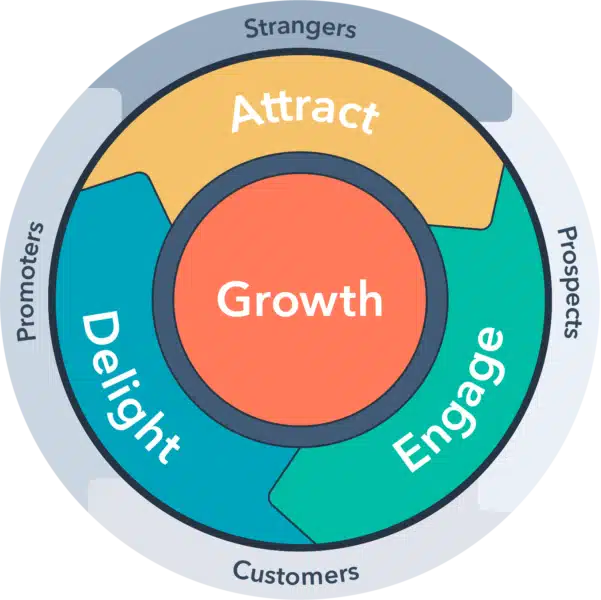Learn the top reasons why content marketing should be part of every business’s growth strategy in today’s digital landscape.
That’s a loaded question, but worth considering, because the benefits of content marketing are almost too numerous to count.
To sum it up, content marketing is important because it’s a cost-effective, sustainable marketing method that nurtures your audience, answers their questions, and builds their trust – all of which helps your business generate better leads, more conversions, and more sales.
Content marketing is all about magnetizing ideal customers to your brand. It isn’t about pushing your products or services in front of their noses and hoping they’ll bite.
Most importantly, a whopping 97% of brands use content marketing because it’s the way modern consumers prefer to interact with and learn about businesses.
What are some other reasons content marketing is important? Why should you use it? Let’s explore.
1. Content marketing builds authority on your own platform – not rented land
As a whole, content marketing’s main focus is building your brand’s authority and establishing relationships with your potential customers.
Where does this all happen? On your website, through the content you publish there.
Unlike social media marketing, where the platforms of focus are distantly owned by large corporations (Twitter, Facebook, Instagram, etc.), content marketing’s platform is one you own.
Publishing on your website means you own all the content that lives there (these are your content assets).
That isn’t true for social media – you don’t technically own anything you post or send from those channels. If, one day, a social media company goes up in smoke, boom! Your content goes with it.
That means focusing on those channels is like building a house on rented land. If your account gets hacked, shadowbanned, or taken down arbitrarily, not just your content vanishes. Your audience and your means of communicating with them will disappear, too.
Not to mention, social media platforms seem to be constantly changing the rules about which posts are prioritized in their feeds. Your visibility there is largely dependent on the whims of company heads and the wiles of algorithms.
That’s why content marketing is a better bet – and a more sustainable option for growth.
2. It grows trust with your audience like no other
65% of consumers immediately feel a brand is both positive and trustworthy after reading a piece of that brand’s educational content.
Content like that, created for a specific audience, tailored to their questions and pain points, and aimed at their perspective, is an incredible trust-builder. And a key tenant of content marketing is researching to understand your ideal customers deeply enough to accomplish all of the above.
Even further, content marketing isn’t about selling, but rather helping. Consistently helping your audience with useful, personalized content showcases not just the brand’s expertise, but also its empathy.
And, ultimately, empathy shows your potential customers that you care, that you hear and understand their problems. The fact that you also have solutions for them (read: your products/services) is the cherry on top.
3. Content marketing brings in higher-quality leads
By definition, high-quality leads are people coming to your brand and content who have a high chance of converting into customers.
These people may fall into two categories:
- They know your brand, are familiar with your expertise and what you sell, and are ready to buy.
- Or, they know they have a problem, they understand the solution they need, and are ready to find the best option.
How does content marketing help pull this type of lead to you?
Through targeted SEO.
Search engine optimization and content are a powerful combination. Targeting keywords with the right search intent in your content will bring in leads looking for the answers or solutions you provide.
Different types of keywords will bring in leads at different stages of the buyer’s journey.
- Awareness stage: They become aware that they have a problem and want more information.
- Consideration stage: They understand what the problem is and are ready to find the best solution.
- Decision stage: They know the possible solutions and are ready to choose the right one.
In their searches, people use certain terms or wording that give major clues as to how close (or far away) they are from making a purchase. People who fall into the “decision” stage are much closer to buying than people in the “awareness” stage.
Here are examples of keywords a buyer looking for a solution to stress might use at different stages of their journey.
 100vw, 800px” data-lazy-src=”https://searchengineland.com/wp-content/seloads/2022/11/buyers-journey-and-keywords-800×450.png.webp” /></figure>
</div>
<p>How do brands use this information in content marketing?</p>
<p>For example, a hotel might target the consideration keyword “stress relieving destinations” in their content. They could use it in a blog with the topic “5 Stress-Relieving Destinations to Wipe Away Your Worries” and include their town or city as one of the options.</p>
<p>Imagine if that blog ranked in the top five of Google search results for that keyword. The hotel would bring in searchers in the consideration stage looking for holiday getaways – the exact people who need the solution the hotel offers.</p>
<p>Those would be highly qualified leads, which could be nurtured with additional content and captured with strategic <a href=) calls-to-action (CTAs). Presto.
calls-to-action (CTAs). Presto.
4. Content helps you rank in search engines for better visibility
Consistent, high-quality content is a major factor in winning search engine rankings.
A site filled with that kind of content is also more robust, more helpful, more useful, and more engaging for its audience. Search engines like that, too.
Ranking at the top of search results is important not just for more visibility online, but also for driving more traffic to your site from search.
The #1 organic (non-paid) position in Google search earns a CTR (click-through rate, which measures the percentage of people who click a specific link on a webpage) of 39.6%, according to recent data.
The #2 organic position has a CTR of 18.4%. And, if you scroll down to the bottom of the first page of Google, the #9 and #10 positions have a dramatically lower CTR of around 2%.
Note that paid search ads, which sometimes appear at the top of Google ahead of organic results, have CTRs that hover around 2%. People usually scroll past ads to find the organic results!
 100vw, 769px” data-lazy-src=”https://searchengineland.com/wp-content/seloads/2022/11/ctr-by-position-769×600.png.webp” /></figure>
</div>
<p>The organic top of Google earns more clicks and drives the most traffic. Creating <a href=) high-quality content with content marketing helps you get there.
high-quality content with content marketing helps you get there.
5. Content marketing costs less than traditional marketing but has a better ROI
Content marketing is a sounder investment than traditional marketing for a few reasons.
It costs less to maintain
Traditional marketing tends to rely on advertising, which in turn runs on a pay-to-play model. The second you stop paying for ads to appear where you want them, they disappear, taking your visibility along with it.
Content marketing costs, meanwhile, are centered more on the up-front expense of content creation. Once a piece is created, published, and distributed, you don’t have to keep paying for its existence or visibility – especially if you invest in SEO.
It has a better ROI
Multiple studies have found that the ROI of content marketing easily outpaces that of traditional advertising. On average, companies with blogs generate 67% more leads than companies without them. They’ll also earn 97% more inbound links, 55% more visitors to their sites, and 434% more indexed pages in Google.
Why is content marketing so much more successful, especially over time? For one, it’s more sustainable, and the return on investment tends to compound as published content gains traction, traffic, leads, and conversions.
6. Consumers would rather see content than ads
Let’s be real: No one would be engaging in content marketing if it wasn’t what consumers prefer.
And prefer it, they do: 62% of B2B buyers read at least 3-7 pieces of content before they’ll talk to a salesperson. And 70% of people would rather read an article about a company than see an ad.
Don’t forget the data on ad blockers, either. People are blocking ads on their computers now more than ever, with 290 million active users per month.
Marketing simply can’t look the way it used to because modern consumers have entirely different expectations, habits, and perspectives that affect their buying decisions.
Today, consumers like to do research before making a purchase. They like to be informed about the best options. They also prefer to shop with brands they like and trust, that have similar values.
Content marketing addresses all of these things, giving consumers content when and where they need it.
7. Your competitors are using content marketing
Don’t forget, even if you’re not using content marketing, your competitors probably are.
97% of businesses use content marketing, and that includes 73% of marketers.
And if they’re doing content marketing well, that means your competitors:
- Have a more robust online presence.
- Have more visibility in online search.
- Draw in more leads.
- Have more deeply engaged audiences.
- Ultimately make more conversions and sales.
If you aren’t showing up with your website and content, too, that’s a giant missed opportunity.
8. It makes your website better – more useful and highly optimized
Content marketing adds mega-value to your website, especially in terms of usefulness and SEO.
Firstly, without content, your site would be nothing more than a shell with a shopping cart. Where would the value lie for visitors? For prospective customers?
Add content marketing, and your site becomes valuable. Useful. Helpful. Intriguing. Interesting.
Visitors will want to stay to read your content because they’ll discover it’s relevant to their interests and problems. They’ll stay to learn.
From multiple good experiences with your content, a visitor will keep returning for more. Their trust in your brand will grow. They’ll come to rely on your expertise. Eventually, they’ll buy what you’re selling as a result.
Secondly, you can’t expect to rank in search engines without high-quality content. It’s just impossible.
With optimized content, your site also becomes valuable to search engines, because entities like Google want to serve users helpful content.
9. It nurtures customers into loyal fans
Content marketing is by definition a nurturing marketing method. It builds and establishes relationships with audiences with helpful, valuable content targeted to their needs, interests, desires, and problems.
As potential customers continually interact with a brand’s content that’s tailored just for them, trust grows and deepens.
Repeat this cycle over months and years, and you’ll earn not just a customer, but a loyal fan who will faithfully return again and again.
HubSpot’s flywheel is a great representation of this:

Consistent content marketing is one of the best ways to improve customer retention. In other words, your content marketing is what will keep them coming back even after they’ve made a purchase.
Content marketing is the present and future of marketing
Content marketing is important precisely because it’s the present and future of marketing.
It’s how consumers prefer to be marketed to. It not only nurtures them, but it also builds loyalty and improves customer retention.
It’s more cost-effective and sustainable than traditional marketing and brings in more leads and ROI.
Content marketing is also how you do SEO right – not to mention win the top positions in Google. It makes your website better for users and search engines, which contributes to a better internet.
And, because content marketing centers on your website, you’ll get the benefits of building your authority on land you own, versus the rented real estate on social media platforms.
Content marketing is a smart and valuable way to grow a brand, plain and simple, and should be part of every business’s growth strategy.
If you haven’t dived in yet, it’s time to jump. What are you waiting for?

